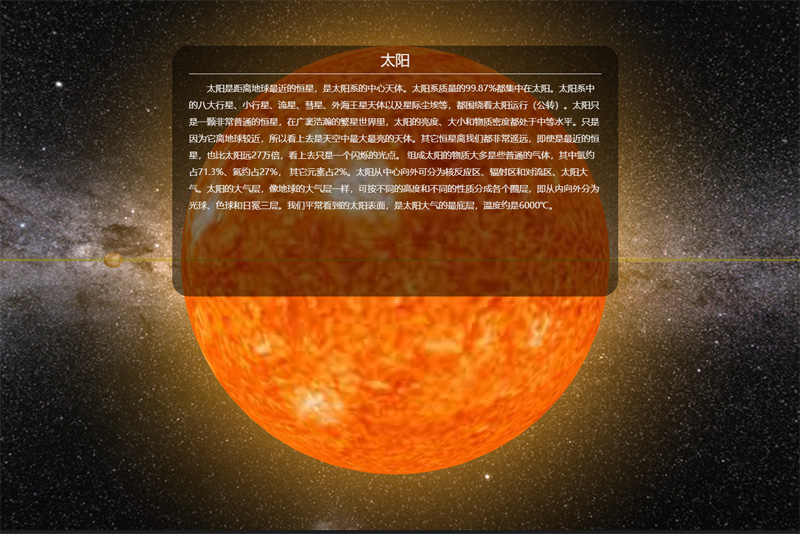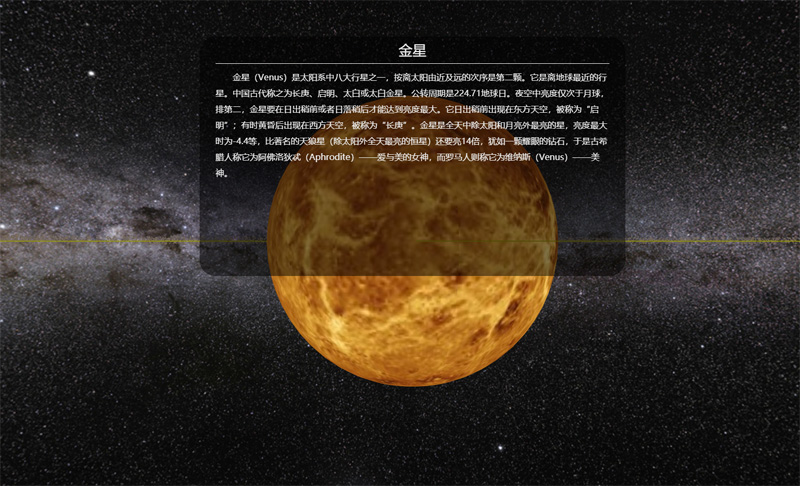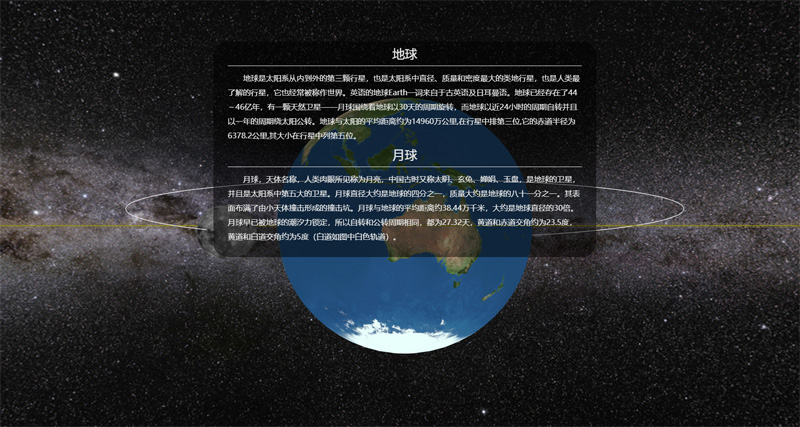three.js 郭先生製作太陽系
今天郭先生收到評論,想要之前製作太陽系的案例,因為找不到了,於是在vue版本又製作一版太陽系,在線案例請點擊部落格原文(載入時間比較長,請稍等一下)。話不多說先看效果圖。



圖片有點多,先放三張,相比於上一個版本,這個版本製作更加細緻,動畫更加流暢。那麼下面分析一下主要程式碼。
1. 先介紹一下變數
這裡查了一些資料radiuses、distances、pub_rotation、self_rotation、pitchs分別為八大行星半徑比、到太陽的距離比、公轉比、自轉比、自轉軸傾角比。
radiuses: [2440, 6052, 6371, 3397, 71492, 60268, 25559, 24766], distances: [5791, 10820, 14960, 22794, 77833, 142940, 287099, 450400], pub_rotation: [88, 225, 365, 687, 4329, 10767, 30769, 60152], self_rotation: [58.65, 243, 1, 1, 0.41, 0.42, 0.64, 0.65], pitchs: [0, 177, 23, 25, 3, 27, 98, 28], sunObj: { radius: 60000//實際695500,為了好看太陽半徑縮小了 }, moonObj: { distance: 800, //實際90 為了好看地月距離放大了 radius: 1737, pitchs: 5, self_rotation: 27.25, pub_rotation: 27.25 }, asteriodObj: { radius: 2000,//2000 pub_rotation: 408 },
2. 引入星球的紋理貼圖
由於星球的貼圖載入比較慢,所以要在貼圖載入之後,再進行後續操作。
let loader = new THREE.TextureLoader(); taiyangT = loader.load('/static/images/texture/planets/sun.jpg'); shuixingT = loader.load('/static/images/texture/planets/shuixing.jpg'); jinxingT = loader.load('/static/images/texture/planets/jinxing.jpg'); diqiuT = loader.load('/static/images/texture/planets/diqiu.jpg'); huoxingT = loader.load('/static/images/texture/planets/huoxing.jpg'); muxingT = loader.load('/static/images/texture/planets/muxing.jpg'); tuxingT = loader.load('/static/images/texture/planets/tuxing.jpg'); tianwangxingT = loader.load('/static/images/texture/planets/tianwangxing.jpg'); haiwangxingT = loader.load('/static/images/texture/planets/haiwangxing.jpg'); yueqiuT = loader.load('/static/images/texture/planets/yueqiu.jpg'); asteriodsT = loader.load('/static/images/texture/planets/asteriod.jpg'); tuxinghuanT = loader.load('/static/images/texture/planets/tuxingring.png');
3. 繪製星球,並在場景中添加
這裡我們寫了一個公共的方法createMesh,這個方法傳兩個參數貼圖和索引,可以根據這個索引找到自轉周期、公轉周期距離等等。
shuixing = this.createMesh(shuixingT, 0); jinxing = this.createMesh(jinxingT, 1); diqiu = this.createMesh(diqiuT, 2); huoxing = this.createMesh(huoxingT, 3); muxing = this.createMesh(muxingT, 4); tuxing = this.createMesh(tuxingT, 5); tianwangxing = this.createMesh(tianwangxingT, 6); haiwangxing = this.createMesh(haiwangxingT, 7); taiyang = this.createTaiyang(); yueqiu = this.createYueqiu(); scene.add(shuixing); scene.add(jinxing); scene.add(diqiu); scene.add(huoxing); scene.add(muxing); scene.add(tuxing); scene.add(tianwangxing); scene.add(haiwangxing); scene.add(taiyang); scene.add(yueqiu);
創建公共網格方法如下
createMesh(texture, index) { let sphere = new THREE.SphereGeometry(this.radiuses[index] * this.radius_ratio, 60, 30); let material = new THREE.MeshBasicMaterial({map: texture}); let mesh = new THREE.Mesh(sphere, material); mesh.position.x = this.distance_ratio * this.distances[index]; return mesh; }
創建太陽網格方法如下
createYueqiu() { let sphere = new THREE.SphereGeometry(this.moonObj.radius * this.radius_ratio, 30, 20); let material = new THREE.MeshBasicMaterial({map: yueqiuT}); let mesh = new THREE.Mesh(sphere, material); mesh.position.x = this.distance_ratio * this.moonObj.distance; let moon = new THREE.Object3D(); moon.position.copy(diqiu.position); moon.add(mesh); return moon; }
4. 星體自轉和公轉
在render函數中調用自轉和公轉函數,控制自轉的屬性就是mesh.rotation。控制公轉的屬性就是mesh.position。這裡使用歐拉角和THREE.Math方法
selfRotate() { shuixing.rotation.copy(new THREE.Euler(THREE.Math.degToRad(this.pitchs[0]), Math.sqrt(1 / this.self_rotation[0]) * this.self_ratio * this.timeS, 0)); jinxing.rotation.copy(new THREE.Euler(THREE.Math.degToRad(this.pitchs[1]), Math.sqrt(1 / this.self_rotation[1]) * this.self_ratio * this.timeS, 0)); diqiu.rotation.copy(new THREE.Euler(THREE.Math.degToRad(this.pitchs[2]), Math.sqrt(1 / this.self_rotation[2]) * this.self_ratio * this.timeS, 0)); huoxing.rotation.copy(new THREE.Euler(THREE.Math.degToRad(this.pitchs[3]), Math.sqrt(1 / this.self_rotation[3]) * this.self_ratio * this.timeS, 0)); muxing.rotation.copy(new THREE.Euler(THREE.Math.degToRad(this.pitchs[4]), Math.sqrt(1 / this.self_rotation[4]) * this.self_ratio * this.timeS, 0)); tuxing.rotation.copy(new THREE.Euler(THREE.Math.degToRad(this.pitchs[5]), Math.sqrt(1 / this.self_rotation[5]) * this.self_ratio * this.timeS, 0)); tianwangxing.rotation.copy(new THREE.Euler(0, Math.sqrt(1 / this.self_rotation[6]) * this.self_ratio * this.timeS, THREE.Math.degToRad(this.pitchs[6]), 'ZYX')); haiwangxing.rotation.copy(new THREE.Euler(THREE.Math.degToRad(this.pitchs[7]), Math.sqrt(1 / this.self_rotation[7]) * this.self_ratio * this.timeS, 0)); // yueqiu.children[0].rotation.copy(new THREE.Euler(THREE.Math.degToRad(this.moonObj.pitchs), Math.sqrt(1 / this.moonObj.self_rotation) * this.self_ratio * this.timeS, 0)); yueqiu.position.copy(diqiu.position); yueqiu.rotation.copy(new THREE.Euler(THREE.Math.degToRad(this.moonObj.pitchs), Math.sqrt(1 / this.moonObj.self_rotation) * this.self_ratio * this.timeS, 0)); asteriods.rotation.copy(new THREE.Euler(0, this.timeS * this.pub_ratio / this.asteriodObj.pub_rotation / 2, 0)); }, pubRotate() { shuixing.position.set(Math.cos(this.timeP * this.pub_ratio / this.pub_rotation[0]) * this.distance_ratio * this.distances[0], 0, -Math.sin(this.timeP * this.pub_ratio / this.pub_rotation[0]) * this.distance_ratio * this.distances[0]); jinxing.position.set(Math.cos(this.timeP * this.pub_ratio / this.pub_rotation[1]) * this.distance_ratio * this.distances[1], 0, -Math.sin(this.timeP * this.pub_ratio / this.pub_rotation[1]) * this.distance_ratio * this.distances[1]); diqiu.position.set(Math.cos(this.timeP * this.pub_ratio / this.pub_rotation[2]) * this.distance_ratio * this.distances[2], 0, -Math.sin(this.timeP * this.pub_ratio / this.pub_rotation[2]) * this.distance_ratio * this.distances[2]); huoxing.position.set(Math.cos(this.timeP * this.pub_ratio / this.pub_rotation[3]) * this.distance_ratio * this.distances[3], 0, -Math.sin(this.timeP * this.pub_ratio / this.pub_rotation[3]) * this.distance_ratio * this.distances[3]); muxing.position.set(Math.cos(this.timeP * this.pub_ratio / this.pub_rotation[4]) * this.distance_ratio * this.distances[4], 0, -Math.sin(this.timeP * this.pub_ratio / this.pub_rotation[4]) * this.distance_ratio * this.distances[4]); tuxing.position.set(Math.cos(this.timeP * this.pub_ratio / this.pub_rotation[5]) * this.distance_ratio * this.distances[5], 0, -Math.sin(this.timeP * this.pub_ratio / this.pub_rotation[5]) * this.distance_ratio * this.distances[5]); tianwangxing.position.set(Math.cos(this.timeP * this.pub_ratio / this.pub_rotation[6]) * this.distance_ratio * this.distances[6], 0, -Math.sin(this.timeP * this.pub_ratio / this.pub_rotation[6]) * this.distance_ratio * this.distances[6]); haiwangxing.position.set(Math.cos(this.timeP * this.pub_ratio / this.pub_rotation[7]) * this.distance_ratio * this.distances[7], 0, -Math.sin(this.timeP * this.pub_ratio / this.pub_rotation[7]) * this.distance_ratio * this.distances[7]); }
5. 使用動畫,提升逼格
這裡使用了tween控制相機的position和lookat屬性,實現空間穿梭的感覺。
initTween() { let pos = {x: 0, y: 0, z: -96, lx: 0, ly: 0, lz: 0}; tween1 = new TWEEN.Tween(pos).to({x: 57.91, y: 0, z: -5, lx: 57.91, ly: 0, lz: 0}, 20 * this.animation_time); tween1.easing(TWEEN.Easing.Linear.None); tween2 = new TWEEN.Tween(pos).to({x: 108.2, y: 0, z: -13, lx: 108.2, ly: 0, lz: 0}, 22 * this.animation_time); tween2.easing(TWEEN.Easing.Linear.None); tween3 = new TWEEN.Tween(pos).to({x: 149.6, y: 0, z: -14, lx: 149.6, ly: 0, lz: 0}, 24 * this.animation_time); tween3.easing(TWEEN.Easing.Linear.None); tween4 = new TWEEN.Tween(pos).to({x: 227.94, y: 0, z: -6, lx: 227.94, ly: 0, lz: 0}, 27 * this.animation_time); tween4.easing(TWEEN.Easing.Linear.None); tween5 = new TWEEN.Tween(pos).to({x: 436.5, y: 0, z: -6, lx: 436.5, ly: 0, lz: 0}, 30 * this.animation_time); tween5.easing(TWEEN.Easing.Linear.None); tween6 = new TWEEN.Tween(pos).to({x: 778.33, y: 0, z: -112, lx: 778.33, ly: 0, lz: 0}, 34 * this.animation_time); tween6.easing(TWEEN.Easing.Linear.None); tween7 = new TWEEN.Tween(pos).to({x: 1429.4, y: 0, z: -155, lx: 1429.4, ly: 0, lz: 0}, 35 * this.animation_time); tween7.easing(TWEEN.Easing.Linear.None); tween8 = new TWEEN.Tween(pos).to({x: 2871, y: 0, z: -46, lx: 2871, ly: 0, lz: 0}, 36 * this.animation_time); tween8.easing(TWEEN.Easing.Linear.None); tween9 = new TWEEN.Tween(pos).to({x: 4504, y: 0, z: -46, lx: 4504, ly: 0, lz: 0}, 37 * this.animation_time); tween9.easing(TWEEN.Easing.Linear.None); tween10 = new TWEEN.Tween(pos).to({x: -600, y: 452, z: 0, lx: 778.33, ly: 0, lz: 0}, 38 * this.animation_time); tween10.easing(TWEEN.Easing.Linear.None); tween1.chain(tween2).onUpdate(onUpdate).delay(50 * this.animation_time).onStart(() => this.show1 = false).onComplete(() => this.show2 = true); tween2.chain(tween3).onUpdate(onUpdate).delay(50 * this.animation_time).onStart(() => this.show2 = false).onComplete(() => this.show3 = true); tween3.chain(tween4).onUpdate(onUpdate).delay(50 * this.animation_time).onStart(() => this.show3 = false).onComplete(() => this.show4 = true); tween4.chain(tween5).onUpdate(onUpdate).delay(50 * this.animation_time).onStart(() => this.show4 = false).onComplete(() => this.show5 = true); tween5.chain(tween6).onUpdate(onUpdate).delay(50 * this.animation_time).onStart(() => this.show5 = false).onComplete(() => this.show6 = true); tween6.chain(tween7).onUpdate(onUpdate).delay(50 * this.animation_time).onStart(() => this.show6 = false).onComplete(() => this.show7 = true); tween7.chain(tween8).onUpdate(onUpdate).delay(50 * this.animation_time).onStart(() => this.show7 = false).onComplete(() => this.show8 = true); tween8.chain(tween9).onUpdate(onUpdate).delay(50 * this.animation_time).onStart(() => this.show8 = false).onComplete(() => this.show9 = true); tween9.chain(tween10).onUpdate(onUpdate).delay(50 * this.animation_time).onStart(() => this.show9 = false).onComplete(() => this.show10 = true); tween10.onUpdate(onUpdate).delay(50 * this.animation_time).onStart(() => this.show10 = false); tween1.start(); },
主要程式碼差不多就是這樣,像這樣製作太陽系並不難,只要你敢想。
轉載請註明地址:郭先生的部落格

